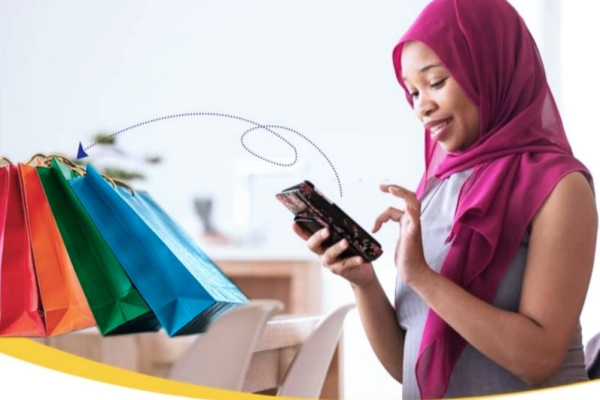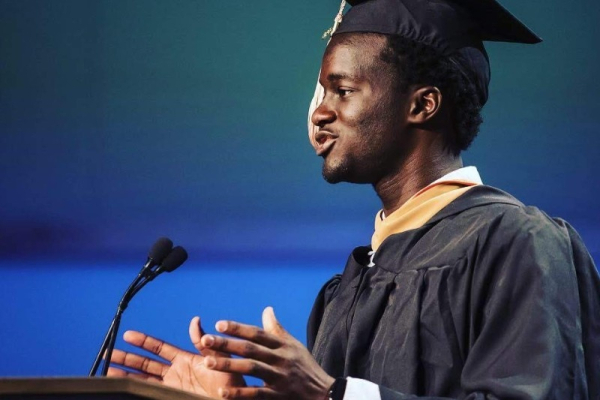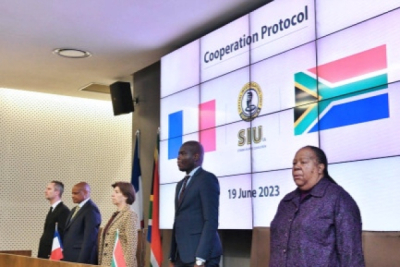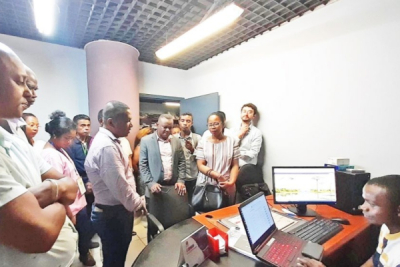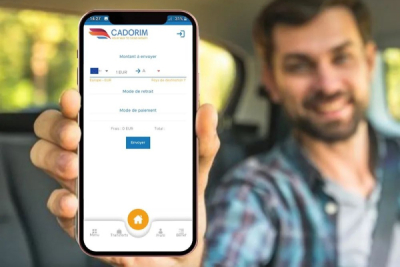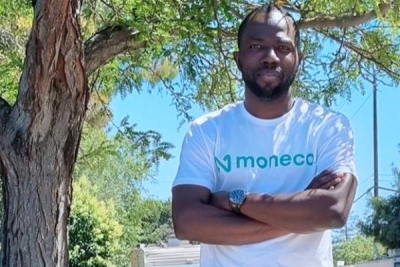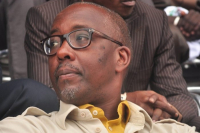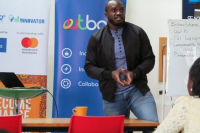In the Hausa language, Kaomini loosely translates to “bring me…”. The platform was launched to promote financial and social inclusion. It is gradually carving its niche, attracting a growing number of merchants and customers.
Kaomini is a virtual marketplace launched, in 2017, by Niger Poste, the public postal service operator in Niger. It enables merchants to sell products using unconventional channels. It also enables populations to purchase various products without having to travel.
"Kaomini has vouched to meet the needs of Suppliers who don't have the means to travel to exhibit their products internationally. [...] On Kaomini, products are ordered online via handheld devices. To order, [buyers] need to first set up an account [...] to secure the merchant’s products on our e-commerce site,” says Nasser Salifou Seyni, operations manager at Kaomini.
The solution currently has an Android app. Once registered, buyers can log in and directly access the various products available on the marketplace, such as groceries, food supplements, livestock, and more. It is also possible to order meals in restaurants or send laundry to the dry cleaner.
To back Kaomini, Niger Poste has set up a delivery service and has around a hundred relay points throughout the country to facilitate various commercial transactions. Payment can be made on delivery or via the site's integrated payment methods. Among others, buyers can opt for mobile money solutions or bank cards.
The platform claims between 70 and 80 orders per month. In the medium term, Niger Poste aims to cover around 50% of the national territory. What's more, most of the products marketed on the platform are "Made in Niger", which facilitates access to the specialties of remote regions by residents in major cities.
Adoni Conrad Quenum
He is passionate about using technology to solve key challenges. After his studies and a few years after working in the United States, he returned to his native country, Senegal, where he launched a healthtech company to solve challenges.
Mouhamed Ndoye (photo) is a Senegalese computer scientist who graduated from the Texas McCombs School of Business with a master's in information technology and management. He is the CEO and one of the co-founders of medtech startup Tanél Health.
The startup, founded in 2020, builds modern platforms for African healthcare companies, notably pharmacies, and insurers. Its goal is to build an integrated tool that connects all healthcare stakeholders.
The company has developed easy-to-use, affordable, and reliable software to streamline pharmacy management. The software enables pharmacy owners to optimally manage inventory, monitor sales, manage cash flow, track inventory, and manage their teams. It features a modern interface compatible with all types of devices. From its dashboard, users have access to detailed reports revealing actionable data for better decision-making.
In 2019, the CEO of the startup behind it co-founded Anythng, a company that reinvents the way modern restaurants communicate with their customers. He served as the CEO of that company till 2020. Still, in 2019, he co-founded Tékkil, a non-profit organization dedicated to connecting and promoting Senegalese-American professionals to become leaders in their careers and communities. He also served as the CEO of that organization till 2022.
In 2021, he took part in the startup acceleration program On Deck. The serial entrepreneur entered the professional world, in June 2010, as a software engineer for Tech Corps, a U.S. tech company. From 2014 to 2018, he was a consultant for Cardinal Solutions, a U.S. IT solutions provider.
Melchior Koba
Africa's digital revolution allures investors and cybercriminals alike, presenting both prospects and risks. In response, numerous countries are ramping up security measures to bolster trust in their information and communication systems.
South Africa and France have signed a cooperation protocol agreement to combat cybercrime and enhance anti-corruption efforts. The agreement, signed by South African Justice Minister Ronald Lamola and French Minister for Europe and foreign affairs Catherine Colonna on Monday, June 19, aims to bolster South Africa's Special Investigating Unit (SIU) by establishing an anti-corruption academy in Tshwane. This academy will benefit the SIU, as well as other law enforcement and anti-corruption agencies within the Southern African Development Community (SADC) and beyond.
The collaboration focuses on enhancing the SIU's cyber-forensic investigations, financial crime expertise, and analytical skills. Ronald Lamola highlighted that this training initiative will bring the country's forensic cyber capabilities up to global standards, essential for addressing transnational cyber threats effectively. "This kind of cooperation will be of great value and help to enhance our skills to deal with cybercrime in the country," said Lamola.
Lamola also emphasized the vital role of this collaboration in fortifying South Africa's cybercrime-fighting prowess and revitalizing investor confidence. With cybercrime incidents on the rise, it is crucial to ensure a secure digital environment. During a hybrid information session hosted by the Council for Scientific and Industrial Research (CSIR) on April 4, 2023, Billy Petzer, research group leader, highlighted that cybercrime causes a significant loss of R2.2 billion to the South African economy annually, emphasizing its substantial impact.
Catherine Colonna, the French Minister, also expressed optimism about the partnership's benefits for South African citizens and the broader SADC region. The SIU has already gained expertise through exchanges with French professionals, with 22 trainers now capable of instructing other investigators.
She also stressed the importance of further collaboration and knowledge sharing in the field of cyber investigations. The agreement represents a significant stride in strengthening cyber forensic capabilities and anti-corruption measures, to protect citizens and foster a secure digital environment in South Africa and the SADC region.
“Since the very early stages of our cooperation, members of the SIU have been to France and have had opportunities…to see and experience the French expertise in the field of mostly cyber investigations. I call for those exchanges to grow,” she said.
Hikmatu Bilali
In Madagascar, the lack of newborn registration is a nationwide problem. By leveraging new technologies, the government wants to address the problem soon.
On Friday, June 15, the authorities of the urban commune of Toamasina in eastern Madagascar launched the trial phase of the digitized civil registration and identity system.
The new solution, which has been two years in the making, will be launched in the next few days in Toamasina, and by the end of 2023, it will be launched in several other communes in the country.
“... The official launch is scheduled for the end of June. Digitizing civil registration data means that birth information can be stored securely, to protect it from fire and loss,” said Volana Rakotonirina, Director General of the National Civil Registration Center at the Ministry of the Interior and Decentralization.
In Madagascar, as in many African countries, the identification of individuals remains a real problem. According to UNICEF data, nearly a quarter of children under the age of 18 in Madagascar have no birth certificate, i.e. some 2.5 million children. An estimated 1 million adults are unregistered and therefore invisible. The reasons for this shortfall lie partly in ignorance of the procedure, but also in structural problems such as administrative malfunctions.
Thanks to the new system, hospital data will be transferred directly to the communes, and the information will be validated by the registrar. Maternity wards will be equipped with connected tablets for this purpose. The aim is to interconnect at least 30 communes by the end of the year.
This digitization project is part of the Malagasy Digital Governance and Identity Management Project (Prodigy), launched in 2019 and financed by the World Bank. The project aims to increase inclusive access to legal identity for all Malagasy citizens and improve access to and the quality of key public services.
Samira Njoya
The solution was launched by a Mauritanian tech entrepreneur to address the challenges faced by his compatriots when sending remittances to their relatives.
Cadorim is a fintech solution developed by a Mauritanian start-up. It enables the Mauritanian diaspora in Europe to send remittance home.
The startup behind the app is based in Nouakchott and Brussels. It was founded, in 2018, by Mohamed Elmoctar Neine. Guests can browse the web platform to get a feel of its services without creating an account.
In case they need to make a transfer, users can register for an account or just log back in and provide the required information to complete the transaction. Among other things, the user will be asked to enter the amount in euros or pounds sterling, the recipient's first and last name, telephone number, the receiving city, and whether the person will receive the money in cash at one of the fintech's branches or in their MauriPay e-wallet.
Once the transaction is validated, the next step is to upload a valid identity document issued by a European country to finalize the procedure.
“The technology used by Cadorim is based on the blockchain which guarantees maximum security. It protects your money both when sending and withdrawing,” the platform assures.
Cadorim also allows users to send money to Senegal and Cameroon. These transactions are carried out through its partner MauriPay. Recipients receive the funds directly into their e-wallets. Unlike Cadorim, MauriPay has a mobile application. In 2019, the start-up won the first edition of the Fintech Challenge organized by the Central Bank of Mauritania
Adoni Conrad Quenum
Kuassi Jimmy Kumako (photo) is a computer engineer with a degree from Dakar's Cheikh Anta Diop University (UCAD). He is one of the co-founders of fintech start-up Moneco, which guides members of the African diaspora as they settle in France. It enables them to open an account, have access to an international payment card and make transfers anywhere in Europe.
His startup, founded in 2022, is a one-stop shop for all the financial needs of the African diaspora in Europe. It is the only startup in the S22 batch to be accepted by Y Combinator the same year it began operations. It was developed to help the diaspora save money by aggregating all their financial needs on one platform.
The Moneco platform enables immigrants settled in Europe to open a current account with local IBAN. It also gives them the possibility to top up their accounts via various methods, set up group saving schemes, send funds to Africa free of charge, and make international payments among other things.
Besides Moneco, Kuassi Jimmy Kumako also co-founded (in 2016), a classified ads platform for SMEs based in Francophone Africa. He is a member of the Benin Business Angel Network, an association of local and diaspora entrepreneurs, investors, and professionals willing to invest, open their networks, and guide entrepreneurs in the Beninese ecosystem.
In 2010, he co-founded SITBusiness, which coordinated the design and use of a geographic information system for non-governmental organizations in Senegal. In 2014, he also co-founded Dev Engine Labs, an agency that supports start-ups and banks in the design, creation, and optimization of digital services to meet their customers' needs.
A former consultant in finance, competitiveness, and innovation at the International Finance Corporation (IFC) and ex-business associate at Google, he worked from 2020 to 2022 for Paystack, a fintech specializing in online and offline payments in Africa, as a developer.
Melchior Koba
Cheikh Tidiane Mbaye is Chairman of the International Jury of the Orange Social Venture Prize in Africa and the Middle East (POESAM). For several years, he has reviewed thousands of high-potential projects. He was interviewed by We Are Tech about the impact of Orange's innovation support ecosystem and his perception of the African digital economy.
We recently attended the 13th edition of POESAM. Looking at the projects you've judged over the years, what's your assessment of the level of tech innovation in Africa?
This is indeed the 13th edition. I've been on the jury for about ten years now, and I've been chairing it for about six if I'm not mistaken. And so, when you look at the number of entries, the interest generated by the prize, the evolution of the media impact, you realize that we're growing fast. To give you a figure, the number of candidates for this year's edition (2023) is around 1,400. And it seems to me that four, even five years ago, we were still around half that number. We've almost doubled in less than five years, and I find that very interesting. Another point to note is that the percentage of women is also increasing. At the moment, we're almost at 30% women, which is very significant. I think it's also important to understand that the projects submitted to POESAM reflect African needs in some way. I find it interesting to observe that these projects reflect not only the ability of young entrepreneurs to create, innovate and develop but also reflect African needs. For example, at the last award, the majority of projects focused on education, health, agriculture, and e-commerce, in order of growth. It's very interesting to see the evolution of innovation in these fields, and the Orange Prize rewards above all social impacts.
Personally, why did you agree to chair the international jury?
As I said, I've been a member of the jury for ten years. I was offered the presidency a few years ago, and I accepted. But what counts for me is the fact that I've been a member of the jury for so many years. I think my choice reflects a passion and a conviction. My passion is development. I'm passionate about development and what it takes to get there. My conviction is that we can do it. We can do it because we have the resources to do it. One of the keys for me is the private sector and the role it plays, particularly the role played by small and medium-sized enterprises. The government also has a role to play. Good governance will accelerate all these, despite the weaknesses. That's what I'm passionate about, and I'm ready to take part in any serious initiative that serves this passion and conviction, highlighting projects that have an impact on everyday life.
How did your love of innovation, which feeds your passion for development, come about?
I worked for Orange as a manager, in particular as Managing Director of Sonatel for 25 years. I was also involved in another field, that of telecoms infrastructure, which I believe is essential to the development of tech entrepreneurship. You need a good base, you need good infrastructure. Everything we've done over the years is based on the infrastructures we've taken several years to install. We've seen what our network innovations bring to communities. The innovative services offered by entrepreneurs are channeled through them. Those innovative services are offered by talented young Africans, particularly those who are promoted, supported, and encouraged by this extremely useful prize [POESAM]. So there's a continuity between what I've done since I started working and what I'm doing today.
What has the experience of chairing the POESAM jury brought you?
I have to say that I'm learning a lot, coming from an infrastructure background. We're talking about innovation and startups here. These young entrepreneurs we're supporting today criticize our activities. They criticize the companies I've worked for. This allows me to correct these companies. It allows me to get to the other side and see how things can be improved. I've intervened several times in several Orange countries to facilitate relations between startups and the Orange operators, which we represent. Operators are big, strong and don't always think of everything. These interactions have given me knowledge and humility too. I think digital inclusion in Africa is happening, and it's already not bad, contrary to popular belief.
What is your assessment of the impact POESAM has had over the years on technological innovation in Africa, and economic and social development in particular?
The prize helps a lot of entrepreneurs and startups. I have some pretty good examples. I have in mind the example of Mr. Johnson from Liberia, who is now developing palm oil-based products to offer renewable energy solutions. Thanks to the POESAM grant he received in 2018, he has doubled his income and created 24 additional jobs. Then there's the Tunisian company Kumulus, which has developed a machine that turns air into water. It managed to raise its first million euros, thanks to us, to increase its visibility. It works with Orange Group companies. There are other examples we can cite. These companies have a concrete impact on their customers. It's not just the POESAM prize-winners that this award has helped, it has stimulated innovation by enabling a large number of young Africans to dare [to innovate] and I think that's something very important. Orange Africa and the Middle East covers 17 countries. Every Orange company in every country has contributed to nurturing this innovation and drive.
Given all the innovations you've seen over the last 13 editions, how do you see Africa's prospects in the global digital economy?
I believe that Africa will play a decisive role in the digital economy. I met an entrepreneur who has worked in some of the world's biggest tech companies and has now returned to Africa. He gave up an attractive position in a big company to create his startup in the health sector. Like me, he too - along with several international firms, the World Bank, the IFC, and specialized organizations - believes that the future of Africa's digital economy will be formidable. I think that this entrepreneurial dynamism is well understood by those of us who have an insightful reading.
Besides its drive-through, the solution also offers food delivery services.
Ordera is a mobile application developed by an Egyptian start-up. It enables users to order food in advance, pay for it and benefit from drive-through service. They can then collect their meal without having to get out of their car, and therefore without having to queue.
Based in Cairo, the start-up was launched in 2019 by Karim Abdel Kader, Noha Bassiouny, and Abeer Mostafa. It has already raised $150,000 to support its growth.
Through its mobile (Android and iOS) app, a user can order food from over 150 partner restaurants, cafés, and fast-foods. He/she can track the order progress and even get the classic delivery service. All the user has to do is enter his or her location to have it delivered.
Ordera also gives its customers loyalty points that can be exchanged for gifts in partner stores. The start-up makes money by charging partners a commission on each order. Its Android app has been downloaded over 50,000 times. After Cairo, it has now expanded to Alexandria, the first step of its nationwide expansion.
Adoni Conrad Quenum
Outbox Hub plays a key role in promoting tech entrepreneurship. Since its inception, it has established a solid reputation as a catalyst for innovation and an invaluable support for budding entrepreneurs.
Outbox Hub is a tech innovation space and incubator based in Uganda. Founded in 2012 by Richard Zulu, also its director, it helps new and aspiring African entrepreneurs keen to use technology to create high-growth businesses.
With its modern and inspiring collaborative workspace, Outbox Hub offers an environment that fosters creativity and idea sharing. Like all incubators, it does not provide just workspaces but also offers comprehensive incubation programs that help startups turn their ideas into sustainable businesses. Selected entrepreneurs benefit from personalized mentoring, specialized training, business consulting, and access to a network of experts and investors.
In collaboration with its partners NSSF Uganda, Mastercard Foundation, JICA, World Food Programme (WFP), USAID Uganda, AfriConEU, Ye! ITC Community, etc., the incubator launched several initiatives to promote youth involvement in the tech industry. These initiatives include UpAccelerate, a one-year initiative to support young entrepreneurs tackling the challenges of sexual and reproductive health in Uganda. There is also the NSSF Hi-Innovator learning lab for agricultural businesses launched on Thursday, June 15, 2023.
Outbox Hub also designs and develops technological solutions that enable organizations to accelerate their social impact. It works to increase the number of women and girls in technology through the conferences and training courses it organizes under its Women in Technology program.
Melchior Koba
From June 14 to 17, the 2023 edition of the digital trade fair VivaTech was held in Paris. On the sidelines of the event, the second edition of the AfricaTech Awards was launched.
Waspito, Kubik, and Curacel are the winners of the second edition of the AfricaTech Awards. They were the healthtech, climate tech, and fintech awardees, respectively.
Waspito, the winner in the healthtech category, is a Cameroonian start-up that connects patients and doctors for instant video consultations via its Android and iOS apps. It was founded in 2020 by Jean Lobé Lobé and has attracted investors such as Orange Ventures and Launch Africa Ventures.
Curacel, the winner of the fintech category, is a Nigerian solution that enables companies to distribute insurance policies and process claims faster. Founded in 2019 by Henry Mascot and John Dada, it also has a mobile app accessible on iOS and Android.
Kubik is the winner of the climate tech category. It is a Kenyan startup founded in 2021 by Ndeye Penda Marre. It transforms hard-to-recycle plastic waste into low-carbon building materials.
The AfricaTech Awards was organized in Paris on Thursday, June 15, during the digital trade fair VivaTech, in partnership with the International Finance Corporation (IFC). It was initiated last year to give African startups more visibility among global investors. At its first edition in 2022, Kenya's Weee Centre (climate tech), Egypt's Chefaa (healthtech), and South Africa's Click2sure (fintech) were the crown winners.
Adoni Conrad Quenum
More...
Launched in 2020 to train young people in several countries, the "Digital School" initiative seeks to ensure continuous innovation and promote digital learning through gamified modules and AI-driven adaptive learning.
Digital School, one of the global initiatives launched by UAE Prime Minister Sheikh Mohammed bin Rashid Al Maktoum, recently inaugurated 66 new digital learning centers in Mauritania, the Emirates News Agency (WAM) reported.
The new centers, created in collaboration with the Emirates Red Crescent (ERC), aim to spread digital skills and edtech solutions across the Arab region.
"Our partnership with the Mohammed bin Rashid Al Maktoum Global Initiatives in The Digital School project in Mauritania and other countries aims to facilitate students' access to advanced digital educational content, encourage learning and knowledge acquisition, overcome challenges, combat school dropout rates, enrich electronic content, and support education that promotes development, stability, progress, and prosperity in communities," said Hamoud Al Junaibi, ERC Deputy Secretary General.
The digital learning centers were inaugurated as part of the second phase of a project born from an agreement signed, in 2021, by the Islamic Republic of Mauritania and the Digital School initiative to establish digital schools in Mauritania.
In its pilot phase, six digital centers were opened in four middle and two elementary schools to benefit 635 pupils. Twelve teachers and three team members were trained in the digital education sector. After the training, certificates were handed out by the University of Arizona and 400 electronic tablets were distributed as well.
The second phase of the project aims to extend this experience to 60 new schools, benefiting 20,000 pupils in primary and preparatory schools. It also includes the training of 146 teachers and an increase in the number of project team members. The ultimate goal is to reach 100,000 pupils and 1,000 teachers over the next three years.
Samira Njoya
To create the right professional framework for workplace fulfillment, a Moroccan startup has developed a solution using artificial intelligence, augmented reality, and neuroscience.
Veezen is a digital solution developed by a Moroccan start-up. It enables companies to monitor the mental and psycho-emotional health of their employees, to positively impact their productivity.
Among other things, it aims to support entrepreneurs in the employee recruitment process and create the right working environment for optimal productivity.
“Healthy Employees are better able to focus on their work, leading to greater productivity and efficiency. [...] Healthy employees have greater energy levels, which can increase productivity as well as overall job satisfaction. [...] Healthy employees are less likely to get sick and need time off work, which can improve overall workplace productivity,” the solution indicates on its web platform.
Through its Android app, users can register by responding to prompts from the embedded virtual assistant. The virtual assistant guides users through the entire process, right up to the eventual appointment and the check-up by an expert. Appointments and check-ups are pretty uncommon as companies initially opt for group follow-ups.
Veezen contributes to the personal development of company staff through conferences and workshops on well-being. It also conducts employee surveys to identify any emotional or affective problems that may be negatively affecting personal and professional life.
Veezen was incubated at Stargate, a Moroccan incubator based on the campus of Mohammed VI Polytechnic University. In 2023, the start-up was one of the hundred Moroccan start-ups that took part in Gitex Africa, a technology trade show held in Marrakech from May 31 to June 2, 2023.
Adoni Conrad Quenum
The software engineer develops fintech solutions for various purposes in the growing fintech industry in Africa.
Andry Randriamanamihaja (photo) is a Malagasy entrepreneur and computer engineer. He graduated from Polytechnic ISPM (Madagascar) in 1998, with a master's in business computing, software engineering, and artificial intelligence. He is also a certified digital finance practitioner.
In 2018, he officially launched the fintech company Vanilla Pay to dynamize the financial sector in his home country. The first tech solution he developed through Vanilla Pay is a mobile payment aggregator that enables business professionals to make online sales securely, conveniently, and automatically. The aggregator integrates all of Madagascar's mobile operators and is now used by universities, training centers, and e-businessmen. The aggregator claims nearly 50,000 active users with a peak of 3,000 financial transactions processed every minute.
Apart from the payment aggregator, the fintech company plans to launch an international payment solution geared toward tourists. The solution, called Vanilla Pay International, will be presented for the first time during the International Tourism Fair Madagascar that started yesterday, June 15. It is an e-wallet that enables tourists to directly send funds to residents’ mobile money accounts once in Madagascar.
Andry Randriamanamihaja, who was incubated by Orange Fab in 2019, tells We Are Tech Africa that he wants to turn Vanilla Pay into a unicorn valued at millions of euros within five years. The VivaTech 2022 participant already has some ideas to make that ambition a reality. He for instance plans to develop a blockchain-based system for real-time money exchange between islands in the Indian Ocean.
Before Vanilla Pay, Andry Randriamanamihaja founded Ariary.net in 2015, a start-up that aimed to revolutionize the financial landscape in Madagascar and democratize online payment.
His professional career began in 1998 with the IT company Advanced Information Systems, where he was an offshore project manager. From 2003 to 2009, he worked on a World Bank project to set up a Public Expenditure Management Information System.
Melchior Koba
When he moved to New York for his studies, Hanin Hadjeb, a young Algerian discovered a new restaurant business model, which he decided to reproduce back at home. Fast Delivery was then born.
Fast Delivery is a digital solution developed by an Algerian start-up. It enables users to order food, shop in supermarkets, and have the orders delivered to homes or offices.
From the Android or iOS apps, users can set up their accounts to access the various services. For orders to get delivered, users need to first input their address or let the mobile app detect it using the GPS feature. Then, they can add products to their baskets and validate the orders.
They can pay via bank card or in cash at delivery. The solution promises delivery within fifty minutes, depending on the weather and traffic conditions. In any case, the clients can monitor the process in real-time through the app.
According to Play Store statistics, the Android version of the application has been downloaded over a hundred thousand times. Fast Delivery only operates in Algiers and Blida and hopes to expand to other major cities in the country.
Adoni Conrad Quenum


